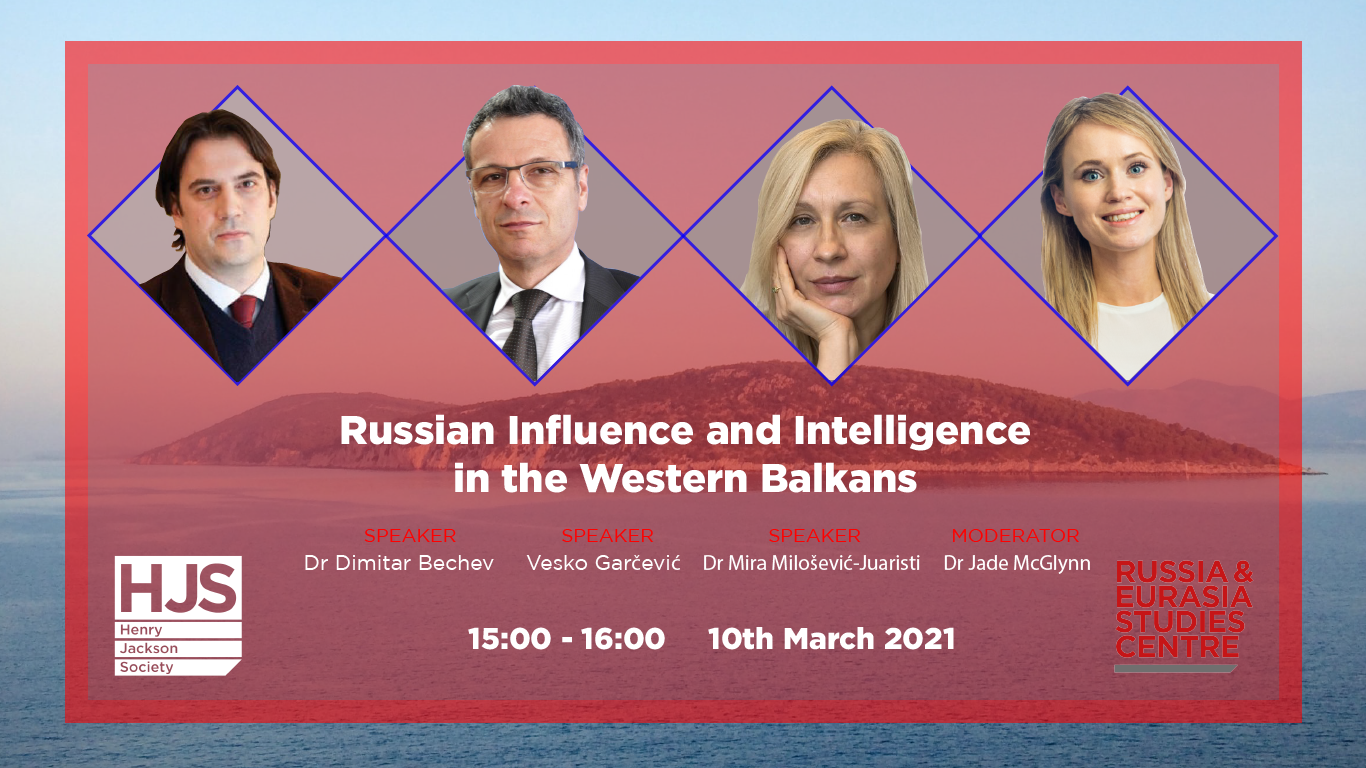Russian Influence and Intelligence in the Western Balkans

- This event has passed.
Russian Influence and Intelligence in the Western Balkans
10th March 2021 @ 3:00 pm - 4:00 pm

The US and EU’s lack of a coherent strategy towards the Western Balkans has emboldened Russia to hinder the region’s integration into the EU and NATO. In recent years, the Western Balkans has been at the forefront of Russia’s strategy to expand its global influence and undermine the West. These strategies have included more traditional soft power and trade approaches, as well as the widespread use of disinformation, cyberwarfare, and intelligence operations.
Some of Russia’s more brazen intelligence activities in the region saw Russian spies take part in a planned coup d’etat in Montenegro 2016. Serious doubts have also been raised as to the nature of the Russian-Serbian Humanitarian Centre, with evidence to suggest its work is focussed not so much on ‘humanitarianism’ as ‘human intelligence sources’.
Yet, while there are many examples of Russia flexing its influence and intelligence muscles in the Western Balkans, the question remains as to how impactful these strategies have actually been. If anything, Russian intelligence activities in the region appear to undermine its efforts to build influence. Despite Vladimir Putin’s sky-high ratings in Serbia, Russia’s relationship with Belgrade is increasingly strained; last year, pro-government newspapers accused Russia of fomenting unrest and Putin cancelled a planned visit. Elsewhere in the region, Montenegro and North Macedonia have joined NATO. While Russia still has close relations with the Republika Srpska enclave – and increasingly good relations with Croatia – it is unclear that either relationship will advance Russian interests in any significant way.
To discuss these questions and gauge the impact of Russian influence operations in the Western Balkans, The Henry Jackson Society is holding a panel discussion with Dr Dimitar Bechev, Dr Mira Milošević-Juaristi and Professor Vesko Garčević.

Dr Dimitar Bechev is a Senior Fellow at the Atlantic Council, Washington DC. Previously he has been a Senior Visiting Fellow at the European Institute, LSE, and a Senior Policy Fellow and head of the European Council on Foreign Relations’ Sofia office. He is also affiliated with South East European Studies at Oxford (SEESOX), a research programme based in St Antony’s College, Oxford. His book Rival Power: Russia in Southeast Europe was published by Yale University Press in 2017.

Vesko Garčević is Professor of the Practice of International Relations at the Frederick S. Pardee School of Global Studies, Boston University and an experienced diplomat. Prior to academia, he served as the Ambassador of Montenegro in Brussels (NATO) and Vienna (Organization for Security and Cooperation in Europe – OSCE and other International Organizations). He was also a Montenegrin Ambassador to Austria, Belgium, Luxembourg and the Netherlands and he has published widely on Russian influence in the Balkans. Professor Garcevic testified before the US Senate Select Committee on Intelligence and the European Parliament on Russia’s interference in the Balkans affairs.

Dr Mira Milošević-Juaristi is a Senior Research Fellow for Russia and Eurasia at the Elcano Royal Institute for International and Strategic Studies and Associate Professor at the IE University School of Global and Public Affairs (Madrid, Spain). She has acted as advisor to NATO, and the European, Spanish and British Parliaments on security issues related to Russia. Dr Milošević-Juaristi is also currently a visiting fellow at CSIS and has published three books: two about the Yugoslav wars and one about the Russian Revolution.

Dr Jade McGlynn is a Research Fellow specialising in Russian political culture and foreign relations at the Henry Jackson Society. She lived in Russia for five years and has worked across the broader post-Soviet space, from Ukraine to Kazakhstan.
Jade holds a DPhil in Russian from the University of Oxford, where she also gained her BA in Russian and Spanish. She also has a Masters by Research from the University of Birmingham. Her DPhil examined how the Russian government have used the politics of memory and national identity to legitimise Russian foreign and domestic policy. She is currently preparing a manuscript based on this research for publication in 2021, entitled Making History Great Again: The Politics of Memory and Belonging in Contemporary Russia. Jade has also published her research as articles, chapters, and reports in leading academic journals, collected volumes, and think tanks. More specifically, she has published on the Russian government’s use of history and historical disinformation in Serbia to build influence and undermine the West.
Prior to joining HJS, Jade worked as a Lecturer and Research Assistant at the University of Oxford, teaching papers in Russian language and literature, as well as courses on History as part of Oxford University’s new access outreach programme (Opportunity Oxford). She has also held fellowships and research positions at the University of Birmingham, University of Voronezh (Russia), and Middlebury Institute of International Relations in Monterrey.
You can RSVP for your tickets HERE


